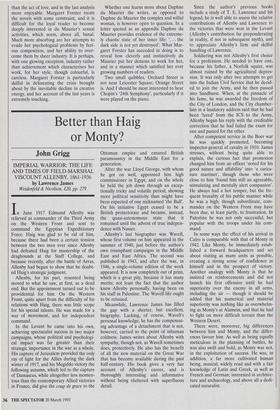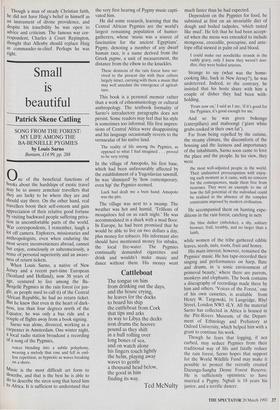Better than Haig or Monty?
John Grigg
IMPERIAL WARRIOR: THE LIFE AND TIMES OF FIELD-MARSHAL VISCOUNT ALLENBY, 1861-1936 by Lawrence James Weidenfeld & Nicolson, £20, pp. 279 In June 1917 Edmund Allenby was relieved as commander of the Third Army on the Western Front and sent to command the Egyptian Expeditionary Force. Haig was glad to be rid of him, because there had been a certain tension between the two men ever since Allenby had defeated Haig for mastership of the draghounds at the Staff College, and because recently, after the battle of Arras, Allenby had begun to show that he doubt- ed Haig's strategic judgment.
Allenby, for his part, resented being moved to what he saw, at first, as a dead end. But the appointment turned out to be providential for him. On the Western Front, quite apart from the difficulty of his relations with Haig, there was little scope for his special talents. He was made for a war of movement, and for independent command.
In the Levant he came into his own, achieving spectacular success in two major campaigns, whose political and psychologi- cal impact was far greater than their strategic importance in the war as a whole. His capture of Jerusalem provided the only ray of light for the Allies during the dark winter of 1917, and his Megiddo victory the following autumn, which led to the capture of Damascus, while altogether less momen- tous than the contemporary Allied victories in France, did give the coup de grace to the
Ottoman empire and ensured British paramountcy in the Middle East for a generation.
After the war Lloyd George, with whom he got on well, appointed him high commissioner in Egypt, and on the whole he held the job down through an excep- tionally tricky and volatile period, showing more political sensitivity than might have been expected of one nicknamed 'the Bull'. On his initiative Egypt ceased to be a British protectorate and became, instead, the quasi-autonomous state that it remained until the advent of true indepen- dence with Nasser.
Allenby's last biographer was Wavell, whose first volume on him appeared in the summer of 1940, just before the author's own triumphant campaigns in the Middle East and East Africa. The second was published in 1943, and after the war, in 1946, a single-volume edition of the work appeared. It is now completely out of print, which is a great pity, because it has many merits; not least the fact that the author knew Allenby personally, having been on his staff in Palestine. The Wavell life ought to be reissued.
Meanwhile, Lawrence James has filled the gap with a shorter, but excellent, biography. Lacking, of course, Wavell's personal knowledge, he has the compensat- ing advantage of a detachment that is not, however, carried to the point of inhuman coldness. James writes about Allenby with sympathy, though not, as Wavell sometimes does, protectively. He also has the benefit of all the new material on the Great War that has become available during the past half-century. His book gives a very fair account of Allenby's career, and is thoroughly interesting and informative without being cluttered with superfluous detail. Since the author's previous books include a study of T. E. Lawrence and his legend, he is well able to assess the relative contributions of Allenby and Lawrence to the victories that were won in the Levant (Allenby's contribution far preponderating in reality, if not in subsequent myth), and to appreciate Allenby's firm and skilful handling of Lawrence.
Soldiering was not Allenby's first choice for a profession. He needed to have one, because his father, a Norfolk squire, was almost ruined by the agricultural depres- sion. It was only after two attempts to get into the Indian Civil Service that he decid- ed to join the Army, and he then passed into Sandhurst. When, at the pinnacle of his fame, he was awarded the freedom of the City of London, and the City chamber- lain in a laudatory address said that he had been 'lured' from the ICS to the Army, Allenby began his reply with the creditable correction that he had failed the exam for one and passed for the other.
After competent service in the Boer war he was quickly promoted, becoming inspector-general of cavalry in 1910. James stresses, without being quite able to explain, the curious fact that promotion changed him from an officer 'noted for his good nature and affability' into 'a carica- ture martinet', though those who were close to him 'found him still an agreeable, stimulating and mentally alert companion'. He always had a hot temper, but the fre- quent brutality of his public manner while he was a high, though subordinate, com- mander on the Western Front may have been due, at least partly, to frustration. In Palestine he was not only successful, but popular with the troops under his com- mand.
In some ways the effect of his arrival in Cairo is comparable with that of Monty in 1942. Like Monty, he immediately estab- lished a forward headquarters and set about visiting as many units as possible, creating a strong sense of confidence in himself and in the prospect of victory. Another analogy with Monty is that he insisted on reinforcements and did not launch his first offensive until he had superiority over the enemy in all arms, including the air — though it should be added that his numerical and material superiority was nothing like as overwhelm- ing as Monty's at Alamein, and that he had to fight on more difficult terrain than the Western Desert.
There were, moreover, big differences between him and Monty, and the differ- ences favour him. As well as being equally meticulous in the planning of battles, he was also swift and bold, as Monty was not, in the exploitation of success. He was, in addition, a far more cultivated human being, musical, widely read and with a fair knowledge of Latin and Greek, as well as French and German; interested in architec- ture and archaeology, and above all a dedi- cated naturalist. Though a man of steady Christian faith, he did not have Haig's belief in himself as an instrument of divine providence, and despite his irascibility he was open to advice and criticism. The famous war cor- respondent, Charles a Court Repington, thought that Allenby should replace Haig as commander-in-chief. Perhaps he was right.



























































 Previous page
Previous page